Drugs that are well established in first-line advanced gastric cancer continue to achieve relatively poor survival prognoses in second-line settings. A new study (RAINBOW) now demonstrates the efficacy of ramucirumab plus paclitaxel in this population. Monotherapy had also already shown a survival benefit, leading to approval in the United States in April.
(ag) It is clear that VEGFR-2 plays a significant role in the progression and pathogenesis of gastric cancer. This is where the VEGFR2 antagonist ramucirumab comes in: In combination with paclitaxel, it showed a significant improvement in overall survival in pretreated patients in RAINBOW.
170 centers, 27 countries, 665 patients
The study, which involved nearly thirty countries and a full 170 centers, included 665 pretreated adults with advanced gastric adenocarcinoma (and also those with adenocarcinoma of the gastroesophageal junction). They received either ramucirumab plus paclitaxel (8 mg/kg, n=330) or placebo plus paclitaxel (n=335).
Clear benefit
The primary endpoint, overall survival, showed a significant prolongation in the ramucirumab group (median 9.6 vs. 7.4 months, HR 0.807, p=0.017). Major adverse events of grade three or higher that occurred more frequently in the ramucirumab group were neutropenia (41 vs. 19%), leukopenia (17 vs. 7%), hypertension (14 vs. 2%), fatigue (12 vs. 5%), and abdominal pain (6 vs. 3%). Febrile neutropenias of grade 3 or higher were rare in both groups (3 vs. 2%).
The authors concluded that ramucirumab plus paclitaxel was thus warranted as a new standard of care in the second-line treatment of patients with advanced gastric cancer.
Source: Wilke H, et al: The Lancet Oncology 2014; 15(11): 1224-1235.
InFo ONCOLOGY & HEMATOLOGY 2014; 2(9): 6.











